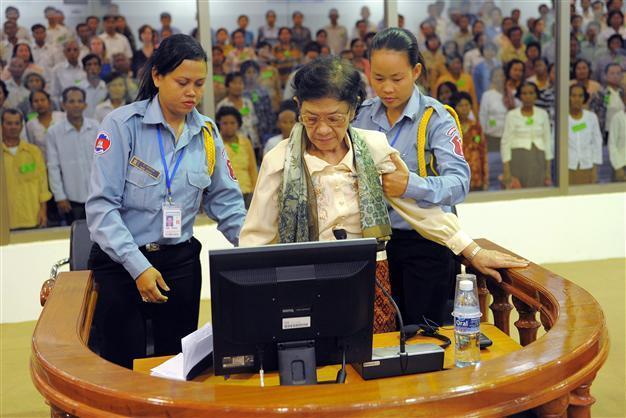Cambodia court frees Khmer Rouge 'First Lady'
PHNOM PENH - Agence France-Presse

This photo taken on April 30, 2010 shows the former Khmer Rouge minister Ieng Thirith (C) standing with assistants in the courtroom at the Extraordinary Chambers in the Court of Cambodia (ECCC) in Phnom Penh for the delivery of the decision on appeal against her pre-trial detention. Cambodia's war crimes court ordered the release of September 13, 2012 of Ieng Thirith, dubbed the "First Lady" of the murderous Khmer Rouge regime, saying she was unfit to stand trial. AFP photo
The former "First Lady" of Cambodia's murderous Khmer Rouge regime was freed on Sunday, a court official said, after the country's war crimes tribunal had ruled she was unfit to stand trial.
Ieng Thirith, 80, who experts say has Alzheimer's disease, was driven in a convoy with police and officials from the purpose-built detention facility at the Phnom Penh court where she has been held since 2007. "The accused Ieng Thirith has been released with some provisional conditions," court spokesman Neth Pheaktra told AFP. "She was picked up by her children," he added, without giving details of where the genocide suspect would be taken.
The release of the ex-social affairs minister, one of only a handful of people ever brought before a court over atrocities during the Khmer Rouge era, will come as a bitter blow to many who survived the 1975-1979 regime, blamed for the deaths of up to two million people.
Cambodia's UN-backed tribunal ordered her release on Thursday but the move was delayed after prosecutors requested tighter conditions.
In a statement on Sunday, the court's highest appeal body said it had agreed to impose extra provisional conditions, including that she registers her address and must relinquish her passport and other travel documents. It will make a final decision on conditions at a later date.
Judges said on Thursday that Ieng Thirith would be incapable of remembering or adhering to any rules, though they stipulated she should not interfere in the case in any way and should remain in Cambodia.
Charges of war crimes, genocide and crimes against humanity against Ieng Thirith, who was the sister-in-law of the late regime leader Pol Pot, have not been withdrawn.
Three other senior Khmer Rouge leaders, including her husband Ieng Sary, are currently on trial accused of the same atrocities.
This case -- only the second ever heard by the court -- is seen as vital to healing mental scars in Cambodia, but campaigners have voiced dismay at the slow progress of proceedings given the advanced age of the defendants.
The health of Ieng Sary, 86, is of particular concern. The frail former foreign minister is currently in hospital with fatigue.
The court has so far jailed just one man -- former Khmer Rouge prison chief Kaing Guek Eav, better known as Duch, who was sentenced to life in jail this year for overseeing the deaths of some 15,000 people.
Led by "Brother Number One" Pol Pot, who died in 1998, the Khmer Rouge dismantled modern society and wiped out nearly a quarter of the population through starvation, overwork and execution in a bid to create an agrarian utopia.
One of the few women in the Khmer Rouge leadership, Paris-educated Ieng Thirith is believed to have been involved in some of the movement's most drastic policies.
She remained a staunch defender of the regime long after its demise in the 1990s, but consistently denied the charges brought against her since her 2007 arrest.
Owing to fears that not all the suspects will live to see a verdict, the court has split their complex second case into several smaller trials, starting with the forced evacuation of Phnom Penh and related crimes against humanity.
The trials have been dogged by funding problems and accusations of political interference from Cambodia's current government, which counts many former Khmer Rouge figures within its ranks.
